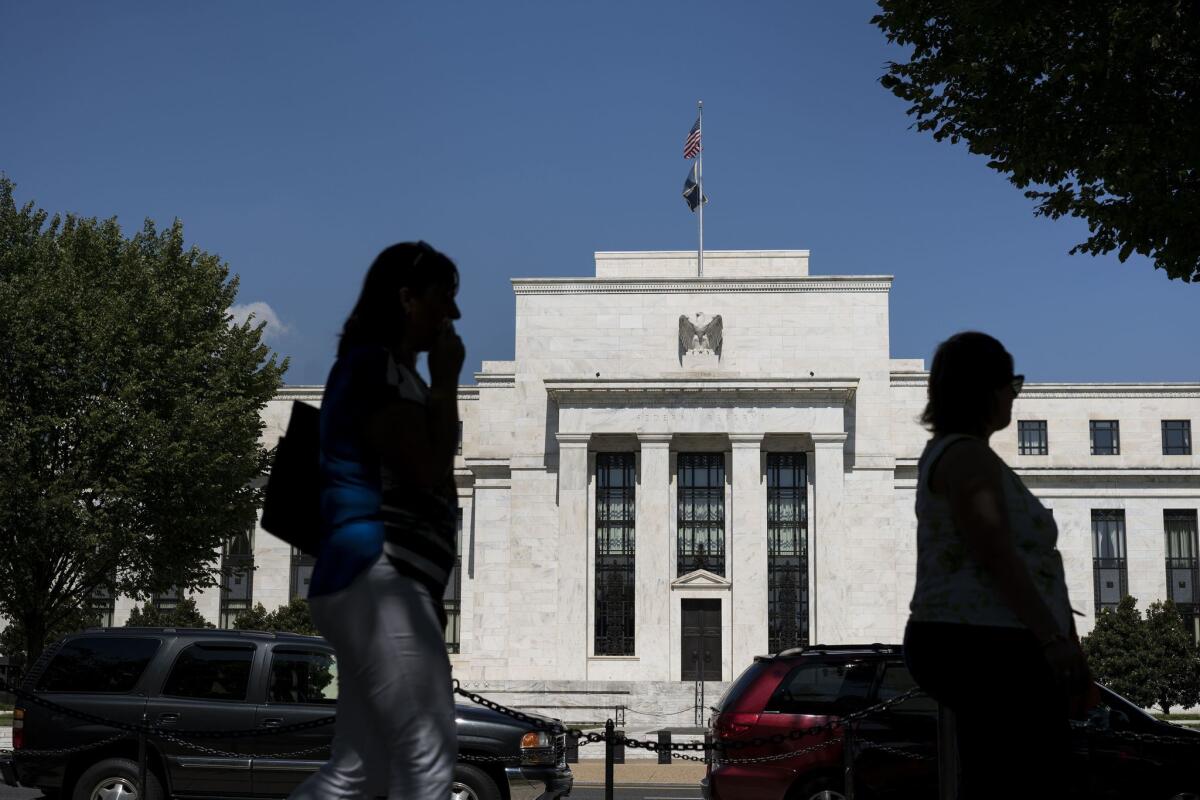Op-Ed: Buddy, can you spare a rate hike?

A view of the Federal Reserve building in Washington, DC, on Sept. 17. The Fed held its key interest rate locked at zero on Thursday, pointing to the downturn in the global economy even as US growth remains steady.
- Share via
Funny how what counts as a good idea depends on who stands to benefit.
In two important economic debates, supposedly no-nonsense analysts handle strikingly similar notions quite differently. They ignore or ridicule arguments offered in support of raising the federal minimum wage, and treat the same arguments with the utmost respect when deployed to demand that the Federal Reserve raise interest rates — in effect, that it raise the minimum wage for affluent investors.
For example, whenever the Fed announces that it will leave interest rates unchanged — as it did Thursday — the no-nonsense crowd complains that they are “unnaturally” low. They offer little in the way of hard analysis for this claim of artificiality. Instead, their case is mainly historical: Interest rates usually have been higher. Yet they dismiss the fact that, relatively speaking, the minimum wage is also historically low. Adjusted for inflation, the federal minimum wage, now set at $7.25 an hour, peaked in 1968 — at $11.15 in today’s dollars.
Sober observers of the economic scene also insist that we need higher interest rates to reward the virtue of saving. But wouldn’t a higher minimum wage reward the virtue of working? Besides, the capital markets are glutted: We actually need more spending, not saving, to keep our economy from being dragged into the recession afflicting Europe, China, Brazil and other emerging economies.
A newer argument is that we need higher interest rates to keep capital’s desire for higher returns from drawing it toward risky investments, where it might inflate bubbles and create economic instability. In essence, we are being asked to pay capital more to keep it off of the streets, where it could get into trouble.
Countless low-income parents have much the same concern about their children. They see their children taunted by peers with expensive electronics, shoes and the like paid for with the proceeds of criminal activity. And they worry that their children will succumb to temptation, especially given the difficulty of affording even the basics on a minimum-wage job.
Our public policy shows scant sympathy for these parents, and concerns about demoralized low-skilled workers rarely surface in debates about whether to raise the minimum wage. Instead, we demand that they act responsibly or suffer the consequences. Perhaps a similarly stern response would be appropriate to those threatening to inflate bubbles if their capital does not receive higher rewards.
This asymmetry in the acceptance of arguments for raising the returns on capital and on labor reflects a broader imbalance in our public economic discourse. The affluent are called “job creators” and must, we are told, be treated most gently. Workers make returns to capital possible just as capital enables returns to labor, yet we never refer to workers as “profit makers.”
When bad mortgages weighed down the economy, loud voices objected to any measures to help the “irresponsible” homeowners. Yet we went to great lengths to shield the lenders — whose participation was just as necessary to the creation of those toxic mortgages and who were far better positioned to appreciate the risk.
Here’s another example: As Congress made permanent certain Bush-era tax cuts that increase the effective rate of return on capital for the affluent, it left the expiration date on modest refundable tax credits that reward low-wage workers’ efforts. The current congressional budget resolution calls for more of the same: tax cuts further increasing returns on capital, paid for in part with cuts to food aid and healthcare assistance for low-wage workers.
Arguments for regulating higher returns to capital but not to labor are remarkably devoid of evidence. If the Federal Reserve’s low interest rates were depriving investors of the market value of their money, we should see accelerating inflation. That’s not happening. On the other hand, if modest increases in the minimum wage were a “job killer,” we should easily find proof in the many states that have set their own standard above the anemic federal level. Yet numerous studies of metropolitan areas spanning the border between high- and low-minimum-wage states have documented no loss of jobs within the more generous states.
The unfortunate truth is that the private sector continues to have trouble finding productive ways to employ both capital and labor. And that problem will only worsen if our trading partners’ economies continue to stumble — or if the Federal Reserve raises the cost of investments with a rate hike.
David A. Super is a professor of law at Georgetown, where he studies poverty and inequality.
Follow the Opinion section on Twitter @latimesopinion and Facebook
More to Read
A cure for the common opinion
Get thought-provoking perspectives with our weekly newsletter.
You may occasionally receive promotional content from the Los Angeles Times.









